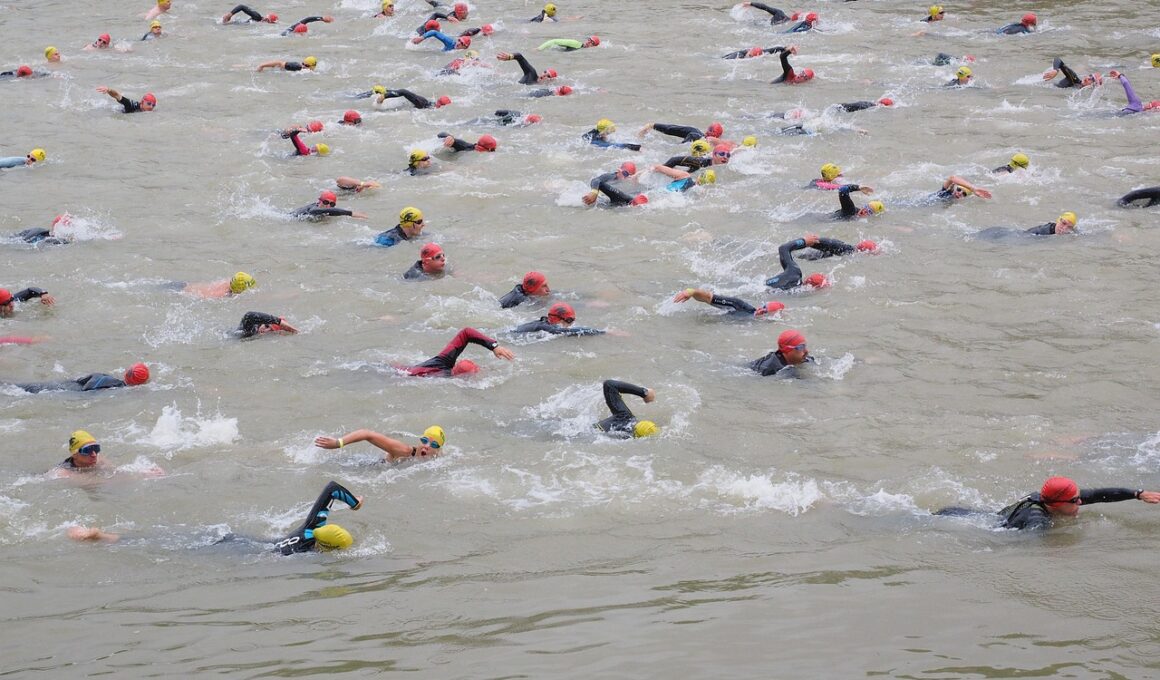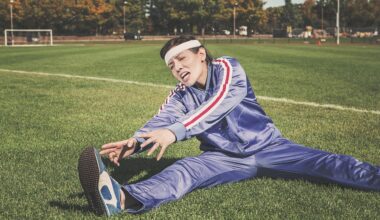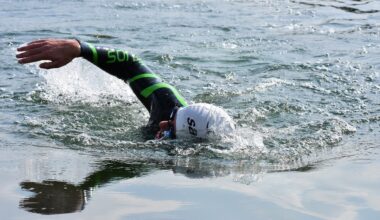The Science Behind Flow State in Triathlon Performance
Flow state, also known as being in the zone, is a psychological phenomenon that can greatly enhance triathlon performance. Athletes often report that they experience a state of heightened focus and energy that allows them to perform at their best when they enter the flow state. Understanding the key components of flow can help triathletes cultivate this experience during training and competitions. The primary elements that contribute to achieving flow include clear goals, immediate feedback, and a balance between challenge and skill level. These elements create an optimal environment for athletes to thrive and reach peak performance. Mental skills training is crucial for triathletes aiming to induce flow state. Techniques such as visualization, concentration, and relaxation can be employed to mentally prepare for races. Additionally, a supportive environment from teammates and coaches can facilitate flow by promoting confidence and reducing anxiety. By integrating psychological strategies into their training regimen, triathletes can increase their chances of achieving flow during events, ultimately leading to improved race execution and performance. Therefore, understanding flow state and its significance can be a game-changer for athletes competing in triathlons.
Triathletes often experience pressure before events, affecting their performance. Learning to control this pressure through mental strategies can enhance an athlete’s ability to achieve flow. The first step is recognizing the signs of anxiety and stress that may arise in the lead-up to competition. Techniques such as deep breathing and mindfulness can assist athletes in managing pre-race jitters. By focusing on the present moment, triathletes can reduce distractions that hinder their performance. Establishing a pre-race routine can also help create a sense of normalcy and stability, soothing nerves and enhancing focus. Visualization techniques can help athletes mentally rehearse their performances, preparing them for various race scenarios and boosting confidence. Moreover, connecting with fellow competitors for support can ease feelings of isolation. Ultimately, incorporating these mental strategies into training can help athletes manage pressure, facilitating smoother transitions into the flow state. Additionally, celebrating small victories during training can reinforce a positive mindset. By cultivating resilience through mental preparation, triathletes can not only enhance their chance of experiencing flow but also build long-lasting skills that benefit their overall athletic journey.
The Role of Mental Imagery
Visualization plays a significant role in helping triathletes achieve flow state. By creating vivid mental images of their race performance, athletes can familiarize themselves with the course and visualize overcoming challenges. This mental rehearsal enables them to practice not just physical movements, but also emotional responses to various situations. Importantly, mental imagery can help improve confidence by allowing athletes to experience success in their minds before executing their plans in reality. By using imagery to reinforce a sense of competence, triathletes enhance their ability to enter flow, reducing the mental barriers that often hinder performance. Techniques such as guided imagery sessions can be beneficial for athletes seeking to enhance their visualization abilities. Moreover, creating imagery scripts tailored to individual strengths and weaknesses can provide focused guidance during training. Athletes should practice these visualizations consistently, integrating them seamlessly into their pre-race preparations. Additionally, incorporating sensory details into mental imagery—such as sounds, sights, and feelings—can heighten its effectiveness. As they become more adept at employing visualization, triathletes improve their overall mental game, increasing the likelihood of harnessing the flow state during crucial moments.
Another key factor that contributes to achieving flow state in triathlons is the importance of setting clear performance goals. Goal-setting provides structure and direction, helping athletes stay focused during workouts and competitions. Triathletes should establish both long-term and short-term goals, making them specific, measurable, achievable, relevant, and time-bound (SMART). By creating achievable goals, athletes can maintain motivation while gradually increasing their skill levels. Tracking progress and celebrating milestones along the way can reinforce a positive mindset and encourage persistence. Emotional milestones also play a significant role; recognizing feelings of accomplishment enhances overall confidence. Furthermore, discussing goals with coaches or teammates fosters an environment of accountability, keeping athletes aligned with their aspirations. Regularly adjusting goals based on performance can also help maintain a sense of challenge without overwhelming an athlete. This adaptability can facilitate a balance that is crucial for achieving flow, as athletes are less likely to feel discouraged by setbacks. By integrating clear goal-setting into their training process, triathletes can amplify their chances of entering flow state, positively impacting their performance when it counts most.
The Importance of Recovery and Rest
In the pursuit of achieving or maintaining flow state, the importance of recovery cannot be overstated. Triathletes often push their bodies to the limit. This creates fatigue that can hinder their ability to reach flow during training or competition. Understanding the balance between training intensity and recovery is essential for optimal performance. Prioritizing recovery techniques such as active recovery, hydration, nutrition, and quality sleep is vital. These strategies help the body and mind repair and rejuvenate, paving the way for efficient adaptation to training loads. Additionally, recovery can enhance mental clarity and focus, reducing the cognitive fatigue that impedes flow state. Implementing structured recovery days in a training plan allows athletes to recharge physically and mentally. Active recovery can range from light jogging to leisure swimming; these activities can help maintain movement without overwhelming fatigue. Furthermore, mindfulness and relaxation exercises can be vital components of recovery. Taking time to unwind mentally prepares athletes for their next session, ensuring they return refreshed and ready to enter flow. Thus, a well-planned recovery strategy is not just a rest period—it’s crucial for triathletes aiming to achieve peak performance through flow state.
Regular evaluation and reflection on performance play a significant role in helping triathletes transition into the flow state. By assessing their training sessions and races, athletes can identify patterns that contribute to successful performances and those that don’t. Journaling can serve as an effective tool for this reflection process, enabling triathletes to track their emotional and physical experiences during workouts. Observing both successes and setbacks allows athletes to adapt strategies and routines to foster better performance. It is also an opportunity to identify elements associated with flow experiences, such as specific types of workouts, mental states, and environmental conditions. Engaging in these reflective practices can create a deeper understanding of personal performance standards, ultimately leading to improved awareness. Furthermore, seeking feedback from coaches and training partners can provide additional insights into performance trends. This collaborative learning fosters growth and adaptiveness in athletes, making them more adept at recognizing moments which promote flow state. Therefore, regularly evaluating their performance empowers triathletes to strategize more effectively and work towards consistent improvement in achieving flow during critical events.
Conclusion: Unlocking Your Potential
In conclusion, understanding flow state and its impacts can greatly enhance a triathlete’s performance levels. By implementing mental strategies such as goal setting, visualization, and reflection, athletes can facilitate their entry into flow. Furthermore, managing pressure and ensuring adequate recovery plays a vital role in maintaining optimal mental health and performance. As triathletes navigate through the demands of training and competitions, cultivating mental resilience becomes essential. Engaging in these strategies builds confidence and emotional control, leading to the ability to perform effectively under pressure. By creating an environment that supports the transition into flow state, athletes can unlock their true potential. These methods do not only improve short-term race performance but also contribute to long-term athletic growth. Armed with this knowledge, triathletes should embrace the power of psychology in their training. Ultimately, the journey toward mastering flow state is ongoing, requiring patience and commitment. However, the rewards—enhanced performance and heightened satisfaction in training—are profoundly worth the effort. As athletes continue to hone their skills and psychological strategies, they move closer to achieving their goals within the fascinating world of triathlon.
Optimizing sports psychology for triathletes involves integrating various mental strategies, with flow state being a crucial component. The combination of deliberate practice, structured routines, mental rehearsal, and performance evaluation is essential for athletes seeking to excel in their respective events. Coaches also play a key role in emphasizing the significance of internal motivation and enjoyment of the sport, which fosters an environment conducive for flow state. By supporting athletes in their endeavors, coaches can highlight the importance of regular feedback and reinforcement during training. Additionally, communication between athletes and coaches can ensure that training plans and performance expectations are aligned. Adapting to individual needs enables tailored strategies that empower triathletes. Ultimately, fostering a love for the sport while cultivating mental skills enhances overall athletic performance. As athletes become more adept at navigating their emotional landscapes, they maximize their likelihood of achieving flow during key moments in races. Therefore, integrating these psychological principles into training and education for triathletes offers beneficial results that extend beyond the competition itself. This holistic approach encourages a lifelong pursuit of excellence, resilience, and continuous self-improvement in the demanding world of triathlon.


